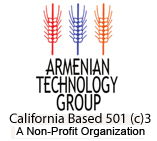U.S. grant gives Armenia's farmers access to American wheat seed
November 14, 1996
With U.S. government funding, the Armenian Technology Group (ATG) will continue to make important strides in providing Armenian farmers with high-quality wheat seed.
Since 1995, ATG has led efforts in Armenia to restore the republic’s seed industry. ATG, a California-based non-profit organization dedicated to investing in the advancement of Armenia’s agriculture, has introduced new varieties of American seed into the former Soviet republic. After extensive testing, ATG, in cooperation with the Armenian Ministry of Agriculture, identified several varieties particularly well-suited to Armenia’s highland climate and terrain. In 1996, the new varieties produced yields nearly three times higher than those from local seeds.
The response of Armenia’s private farmers affirmed the success of ATG’s program. In 1996, about one-third of the wheat seed sown in Armenia was generated through ATG’s seed multiplication project.
The $500,000 grant from the U.S. Agency for International Development (AID) ensures that the benefits of the seed multiplication project will reach a widening circle of Armenian farmers. The grant, channeled through the U.S. Department of Agriculture, will enable ATG to rebuild the infrastructure of the seed industry in Armenia. ATG’s plans call for the establishment of a seed producers association, as well as new agencies devoted to verifying and improving seed quality. Ultimately, ATG hopes that the work of the wheat multiplication project will be carried on by private businesses in Armenia.
“As an admirer of ATG and all it has done in Armenia, I am very satisfied that ATG will be doing the seed multiplication project,” said Peter Tomsen, U.S. ambassador to Armenia.
U.S. government funding will cover about 60 percent of the seed multiplication project’s costs in 1997. (In all, ATG has administered roughly $4.5 million in U.S. grants for Armenian agriculture in the past five years.) To supplement its AID grant, ATG has raised money from private foundations and international donors. ATG has also built a network of volunteer specialists in the United States, many of whom are experts in wheat cultivation.
ATG’s efforts are particularly critical in light of Armenia’s uphill struggle since gaining independence. During the Soviet era, Armenia received 80 percent of its wheat from other Soviet republics. Since the collapse of the Soviet Union in 1991, Armenia has been forced to turn to international humanitarian relief to make up the shortfall. At the same time, many of Armenia’s newly private farmers have emphasized staple food crops, such as wheat and potatoes, over the tree fruit, grapes, and other specialty items that marked Armenian agriculture under Soviet rule. ATG has channeled its energies toward advancing Armenia’s long-term agricultural development by working directly with private farmers.
For more information about how you can help Armenia’s farmers, contact the ATG office at (559) 224-1000 or by e-mail (info@atgusa.org). Tax-deductible donations can be sent to ATG; 1300 E. Shaw, Suite 149; P.O.Box 5969; Fresno, CA 93755-5969.
You may also donate to ATG online.

Follow Us